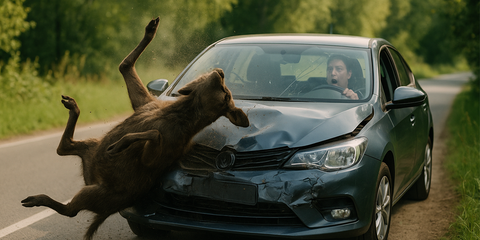
You Just Hit an Animal While Driving in Singapore — What Happens Next?

It Happens in a Second—But Lingers in Your Mind for Days
The drive home is peaceful, possibly after enjoying dinner with friends. The road is empty, and the air is still. Suddenly—a blur. A bump. You slam on the brakes. In the glow of your headlights, you see it: a small body lying on the asphalt. Your heart sinks.
Was that a stray cat? A civet? Do you keep going? Is it your fault? You look around, unsure if anyone else saw. Then the realization strikes: you have just become part of a situation that many drivers in Singapore face, yet few discuss openly.
What happens next involves not only your feelings but also the legal requirements and what compassion requires.
It is not uncommon, and you are not alone in this experience.
In the first half of 2025, several heartbreaking incidents made headlines — from cats in Yishun and Tampines found lifeless near road shoulders to wildlife such as monitor lizards and even otters fatally hit near green corridors.
While initial speculation often suggests cruelty, NParks confirmed that many of these deaths were likely accidental, resulting from vehicle collisions. It’s a subtle problem, obscured in plain view.
However, there is one important thing to recognize: you are not powerless in this situation. The actions you take in the next few minutes could potentially save a life, or at least demonstrate that someone still cares.
The First Thing You Must Do: Stop (If It’s Safe)
Legally, if you hit an animal in Singapore — whether it’s a pet, stray, or wild animal — you are required by the Road Traffic Act to stop, as long as it’s safe to do so.
Yes, that includes cats. And dogs. And even wildlife like civets, wild boars, or otters.
Stopping is not an admission of guilt; it is a legal and humane obligation. You are not expected to handle the animal directly. But leaving the scene without checking is punishable by law, with fines up to S$3,000 or even jail time for serious cases.
What You Should Do (Step by Step)
If this ever happens to you — and we hope it never does — Here are the exact steps to follow:
-
Pull over safely, and turn on your hazard lights.
-
Keep calm and assess the situation from a distance.
-
If the animal is still alive and moving, call:
-
ACRES (for wildlife): 📞 9783 7782
-
SPCA (for pets and strays): 📞 6287 5355 ext. 9
-
If the animal has died, contact:
-
NEA: 📞 1800 2255 632 (for safe removal)
-
Do not try to move wild animals, especially larger ones like wild boars or monitor lizards.
-
If there’s a traffic hazard, call the Police or LTA to help secure the road.
-
Take photos of the scene — this protects you legally and helps with animal rescue investigations later.
These steps may take 10 minutes. But they may be the most meaningful 10 minutes you spend behind the wheel.
Why This Matters More Than Ever
Singapore is becoming greener, with more wildlife corridors, park connectors, and inter-estate crossings. While this is great for biodiversity, it also means more encounters between humans and animals on the road.
The NEA receives thousands of reports about dead animals each year. However, many reports go unaddressed because drivers often assume someone else will handle it or, worse, they simply do not care.
In 2025, animal organizations like the SPCA and ACRES are intensifying their efforts to raise awareness. Their message is clear: compassion should not be conditional.
You Could Save a Life — Or At Least Offer Dignity
Not every animal survives a collision, but many do if help arrives quickly. There are stories of drivers who have called ACRES in time to rescue injured civets for rehabilitation. There are accounts of strangers rushing cats to clinics and hawks being nursed back to health after sustaining minor injuries from side mirrors.
Even if it feels too late, taking the time to stop still matters. It demonstrates to the neighborhood that this life was acknowledged and that someone cared enough to make an effort.
It matters to the animal, and it matters to those who witness it. And someday, if it were your pet out there, wouldn’t you hope that someone else would stop too?









